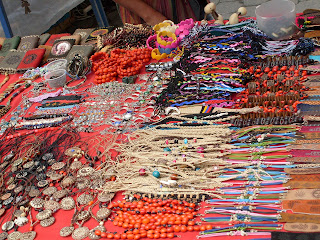
Wednesday, 2. April 2008
“Feco Ni’
Today was an extremely productive day. Although it didn’t seem like it would be, as all of us except ‘papa’ José (he has adopted us now), were hanging over our caffeine dose to rise and shine. A beaming José who went running in the morning, had enough energy for the three of us.
We first made our way to meet Renan Tadeo, the president of the “Federació De Pueblos Negros Cuenca y Chota” (Feco ni) which is a federation for Afro-Ecuadorian farmers in the village of Chota and Cuenca. During the meeting he told us that the federation is trying to reunite the different villages in the area to improve the current situation in agriculture and incorporate new methods/crops. One of the successful initiatives was “Project Tuna” which isn’t the tuna the fish, but instead the fruit of the Cactus plant.
He also told us about the problems the villagers have faced which include drug addiction and alcoholism. Furthermore, he explained to us another initiative which has been put in place to support the development of the villagers. Feco Ni gives financial support to the families in the village depending on their situation the fund varies. It resembles the Credit Union system to a certain extend. When asked if his organisation is collaborating with the Fundaciones “FundeCruz” and “Tin Delgado” however, he seemed evasive. We wonder if there is more to that story.
Final thoughts:
Although Renan Tadeo gave us valuable information, there seems to exist a lack of “interest” in the collaboration with our organisations within the valle. Renan is a very intelligent man, however the question emerges if more can be done to improve the initiative in the valle and that not one company is taken over the valle but that the villages also have representative organisations that support the villagers thoughts and wishes. See Mission Frijoles.
“Marianita Chalá”
After our first meeting in the morning we moved on to meet Marianita Chala in Carpuela who is a teacher at Colegio de Tecnica. She also doubles up as a representative of “el grupo de jovenes” (Youth group) in Valle del Chota. This initiative is supported by NGO’s such as “Prodeci”. This group has been established by the catholic church with the following aims:
- To form leaders
- To reunion the communities
- Keep culture throughout the generations alive
- To form strong characters
She explained to us that each village in Valle del Chota has one group of teenagers, aged 15 to 18. These groups discuss amongst each other, topics including sexuality, criminality, drugs, etc. The problems these groups face is that the members often leave the Valle after their graduation from College to seek jobs in bigger towns like Iberra, Quito, etc. Also and interesting fact is that people who do stay back, tend to become policemen, and some even priests or nuns.
We then moved on to talk about the problems faced by the college. There are several colleges in the Valle included in Carpuela, Iberra, Pimampiro, St.Rafael. Marianita says that approximately 30 students (más o menos) come from Piquiucho. In general the number of students has increased over the last years, as the government supports the colleges with facilitating them with books and clothes. The number has steadily increased from 300 to 684 students with a strong tendency to increase. The students are in school half-day, commencing at 6.30am till 13.30. The subjects that is taught includes Arithmatic, Social/Natural Sciences, English, and Music and students can go into specialisations such as IT, Mechanical or Chemical subjects. Although the colleges have managed to receive financial support from the government the families of the students still need to pay a fee and a small fee to use the school bus which goes around the villages to collect the groups of students. Not every family can afford to pay for the fees, and therefore puts a road block (no pun intended) children’s education. Their only option then is to work on the farm or take up some small jobs in factories to support the household. What follows then is the usual path of vices….
Final Thoughts:
Everyone should have the right to receive and have access to education. Education is the way out… the way ahead even.
Sarah and Kartik





